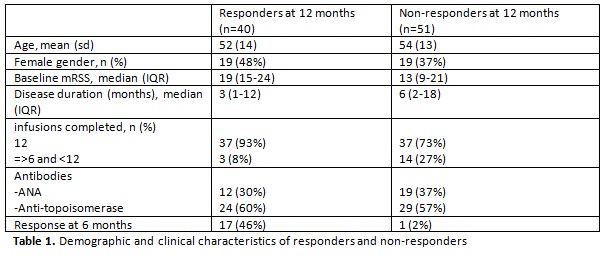Session Information
Date: Tuesday, October 23, 2018
Title: Systemic Sclerosis and Related Disorders – Clinical Poster III
Session Type: ACR Poster Session C
Session Time: 9:00AM-11:00AM
Background/Purpose: Patients with systemic sclerosis who have proximal skin involvement are classified as diffuse cutaneous systemic sclerosis (DcSSc). Patients with progressive skin involvement have worse prognosis. Treatment options consist among others of cyclophosphamide iv pulse therapy (iv CYC). Recent studies show significant improvement of skin thickening in patients treated with cyclophophamide orally, but the effect of iv CYC on skin involvement remains unclear. Our aim is to examine the extent of skin involvement during 12 monthly iv CYC in DcSSc and to identify factors that predict response to therapy.
Methods: Patients with DcSSc receiving iv CYC between 2004 and 2016 were included. Skin involvement was accessed with the modified Rodnan Skinscore (mRSS) at baseline, six, 12, 24 and 36 months by the same rheumatologist. Data of baseline and at least one follow-up measurement were included. Missing mRSS data were imputed using multiple imputation by chained equation. Patients were classified as responders if the mRSS decreased at least 5 points and 25% from baseline at month 12. A prediction model for response at 12 months was created using backwards logistic regression considering baseline variables and response at six months as possible predictors.
Results: A total of 91 patients were included (Table 1). The mean improvement of mRSS over time was -4.05 (95% CI -5.53 to -2.55) (Figure 1). 43% of patients had a response according to the criteria.
In univariate prediction models, baseline mRSS (OR 1.06, p=0.024), response at six months (OR: 37.45, P<0.001) and completed treatment (yes/no) (OR: 4.108, p=0.033), were significant predictors of response at 12 months. For the last variable it should be mentioned that some patients who did not achieve a response at month 6 did not continue iv CYC for that reason.
Figure 1. mRSS course of all patients during iv CYC
Conclusion: This study shows that only 43% of treated DcSSc patients experienced clinical important improvement of skin involvement following iv CYC. Response at month six is the best predictor for response on month 12. This could imply that at this time point, counseling about other available treatment options, should be considered in those patients.
To cite this abstract in AMA style:
Kersten B, den Broeder N, van den Hoogen F, van den Ende E, Vonk M. What Is the Effect of Cyclophosphamide Iv Pulse Therapy in Patients with Diffuse Cutaneous Systemic Sclerosis on Skin Involvement: An Observational Study [abstract]. Arthritis Rheumatol. 2018; 70 (suppl 9). https://acrabstracts.org/abstract/what-is-the-effect-of-cyclophosphamide-iv-pulse-therapy-in-patients-with-diffuse-cutaneous-systemic-sclerosis-on-skin-involvement-an-observational-study/. Accessed .« Back to 2018 ACR/ARHP Annual Meeting
ACR Meeting Abstracts - https://acrabstracts.org/abstract/what-is-the-effect-of-cyclophosphamide-iv-pulse-therapy-in-patients-with-diffuse-cutaneous-systemic-sclerosis-on-skin-involvement-an-observational-study/


